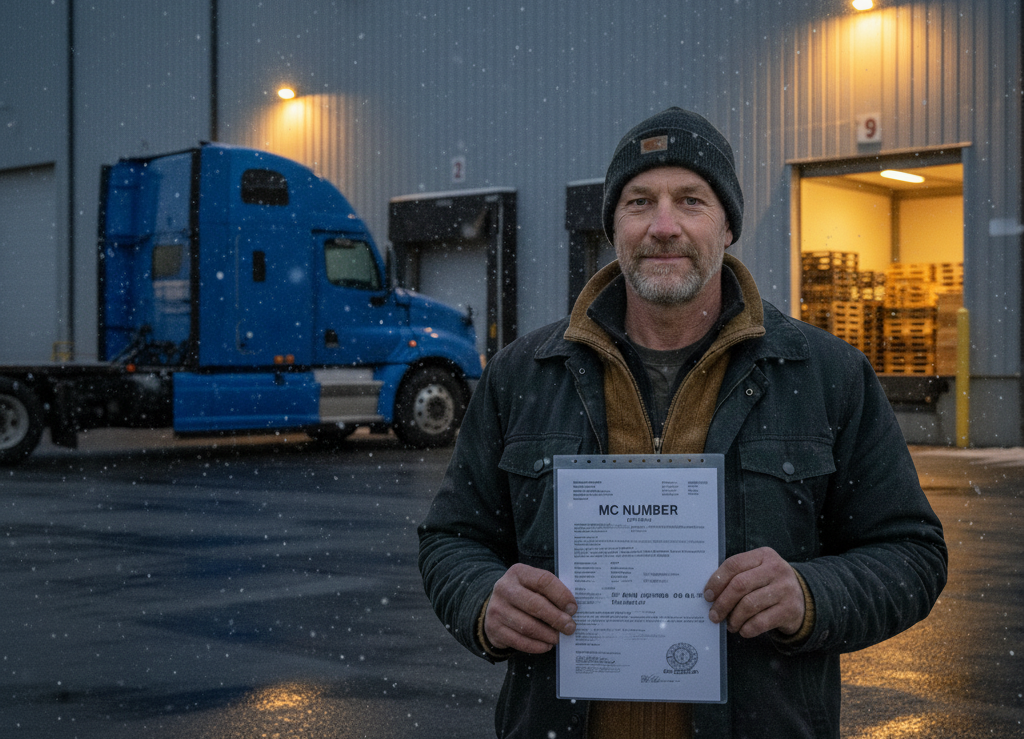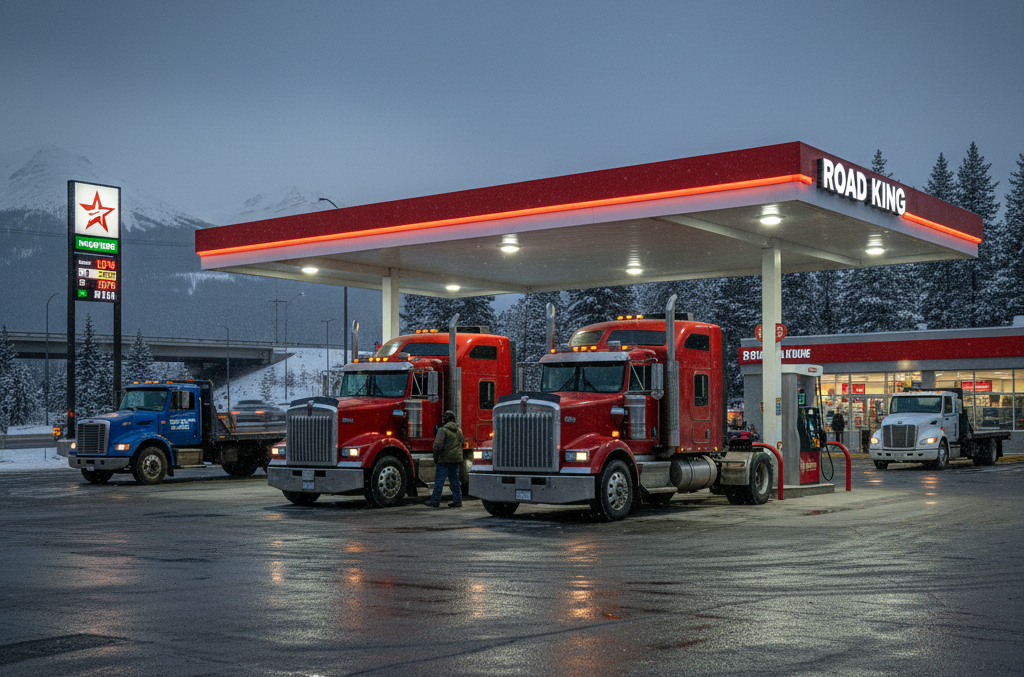What is an Owner-Operator Lease Agreement?
An owner operator lease agreement is a formal contract between a trucking company and an independent truck owner or owner-operator. This agreement outlines the terms and conditions under which the owner-operator provides their vehicle and transportation services to the company. This includes payment terms, maintenance responsibilities, load assignments, and the duration of the partnership.
Thus, a truck lease agreement establishes a framework that governs the working relationship. With it, both parties understand their obligations and expectations. For instance, owner-operators can obtain an option to cooperate with a large fleet without significant investments in infrastructure. Trucking companies gain access to a flexible and scalable workforce. By clearly defining roles and compensations, the owner operator lease agreement helps mitigate potential disputes.
Types of Owner-Operator Lease Agreements
Navigating the specifics of owner operator agreements can be complex. Still, understanding the different types of contracts is crucial for anyone who seeks to thrive in the trucking industry. Owner operator lease agreements provide a framework for the relationship between trucking companies and owner-operators, defining the rights, responsibilities, and financial arrangements.
Each owner operator lease agreement suits different business models, financial situations, and personal preferences. To make informed decisions, it’s necessary to explore the various types of agreements and assess available lease options.
The common lease agreements include lease programs, lease-to-purchase agreements, and lease-on owner operator agreements.
Lease Program
A lease program is an agreement between a trucking company and an owner-operator who wants to operate as an independent contractor without purchasing their own truck. Thus, a driver pays a monthly or weekly lease fee to use a company’s vehicle. Often, this option also includes insurance coverage, fuel, and maintenance costs. A lease program is ideal for those looking for flexibility without the financial burden.
With lease programs, the owner-operator may obtain various benefits, including maintenance support, access to company resources, and sometimes freight assistance from the company. This allows drivers to operate without the significant upfront investment required to purchase a truck and launch their own trucking operations. Thus, it can be a suitable option for drivers who are new to the industry.
While this lease agreement for owner operator can provide access to reliable equipment and support, it can limit autonomy over the vehicle. For instance, the company may set mileage limits and requirements for truck maintenance.
Lease-to-Purchase
A lease-to-purchase agreement is an ideal choice for owner-operators who want to own their truck. This type foresees that the driver leases a truck from the company with a structured payment with an option to buy the vehicle at the end of the term. This allows independent truck drivers to work towards full ownership while generating income and building a career.
With this type of lease agreement, owner-operators can benefit from a lower initial investment compared to outright purchasing a truck. The payments made during the lease period contribute toward the eventual purchase price. In addition, a lease-purchase agreement includes provisions for maintenance and insurance.
A lease-purchase agreement is beneficial for those who want to gain valuable experience and establish their reputations as reliable operators. Thus, you can invest in your future without purchasing a truck.
Lease-On Owner Operator Agreement
The lease-on owner operator agreement is a contract that allows independent truck owners to lease their vehicles and services to a larger trucking company, maintaining ownership of their truck. This agreement type gives the driver more control over their business operations, including maintenance and scheduling, while gaining access to the trucking company’s freight network.
A lease-on owner operator agreement is a popular option among independent truck drivers who want to retain their independence and benefit from the load opportunities and administrative support. The lease-on agreement usually involves the company’s assistance with handling load assignments, billing, and some back-office functions. Thus, drivers can focus on driving and maximizing their earnings without the administrative burdens.
A lease-on agreement also provides owner-operators the possibility to negotiate their rates and choose the loads they want to haul. In addition, the trucking company may offer valuable resources, fuel discounts, and logistics support.
Key Components of an Owner-Operator Lease Agreement
An owner operator lease agreement is a multifaceted legal document that includes a range of key components. They are essential for a clear and mutually beneficial relationship between the trucking company and the owner-operator. Both parties should understand and carefully review these components to ensure compliance, clarify expectations, and minimize potential disputes.
Parties Involved
The first main component of an owner operator lease agreement is the parties involved in the cooperation. Usually, they are the transportation company and the owner-operator. The section outlines the legal names, business addresses, and contact information.
Both parties should clearly define and understand who is responsible for what aspects of the collaboration. This provides adherence to legal standards and a foundation for accountability during the lease period. In addition, well-defined obligations and benefits of each party simplify communication and help avoid legal disputes and claims.
Duration
The duration of the lease agreement sets the length of time the owner operator lease agreement will be in effect. Time can vary depending on the type of lease agreement, ranging from short-term leases lasting months to long-term contracts for several years.
The lease agreement should clearly outline the start and end dates of the agreement with any renewal options or conditions. Clearly defined duration helps owner-operator and logistics company manage expectations, allowing both parties to assess the viability of their business relationship and providing a clear timeline for performance evaluations.
Equipment Requirements
Equipment requirements are also a critical part of the owner operator lease agreement. It details standards and conditions for the truck and other equipment that the owner-operator driver must meet.
For example, equipment requirements can include the truck’s type, model, and condition. The aim is to ensure its compliance with safety regulations and operational needs. The logistics company can also include requirements for maintenance, inspections, and necessary modifications.
Clear requirements ensure both parties understand their obligations, contributing to safety, reliability, and efficiency in operations.
Termination Procedures
Termination procedures outline the conditions under which parties may end the lease agreement before its expiration date. This includes the rights and responsibilities of both parties, ensuring a transparent process.
Usually, the termination process should include notice periods, grounds for termination (such as breach of contract, failure to meet obligations, or unforeseen circumstances), and any penalties or fees for early termination.
With clear terms, both parties understand the consequences and have a sense of security. This also helps avoid potential conflicts and legal disputes.
Control and Possession
The control and possession section clarifies who holds the truck ownership and operational control of the truck during the lease term. Usually, the owner-operator keeps possession of their vehicle, while the trucking business has operational control concerning load assignments and company policies.
This section involves the responsibilities of an independent driver and trucking company regarding the operation and maintenance of the truck. This ensures the vehicle is operated safely and in accordance with industry regulations, protecting both parties.
Compensation Structure
This is a fundamental element of a lease agreement for the owner operator. This section details how owner-operators will be compensated for their services, including rates, payment schedules, and any additional fees or deductions.
Usually, compensation may be based on a per-mile rate, a percentage of the load value, or a flat fee per delivery. The lease agreement specifies whel regular lease payments will be made and outlines the invoicing and payment processing process. In the short term, the compensation section ensures fair compensation for the owner-operator.
Tips for Successful Lease Agreements
Signing a lease agreement can be a significant step for any professional. The owner-operator can ensure long-term career satisfaction and profitability with a successful arrangement. A well-structured lease agreement can lead to mutual benefits for both parties. Thus, you should carefully navigate all components and different types of lease agreements, whether you’re an owner-operator or manage a transportation business.
Understand the terms and conditions. Before signing an agreement, you should carefully read and understand all terms and conditions. Pay special attention to compensation, duration, equipment requirements, and termination process. If anything is unclear or seems unsatisfying for you, don’t hesitate to ask or seek clarification from the other party. A well-informed truck driver is better equipped to navigate the lease agreement effectively.
Negotiate fair compensation. Compensation offers can vary widely. Thus, it’s essential to negotiate terms to ensure fair compensation for owner-operators. In addition, the rate must align with industry standards and the financial expectations of both parties. Remember to discuss additional benefits, as these can significantly impact earnings and job satisfaction. This can foresee additional factors like bonuses for on-time deliveries, fuel surcharges, and reimbursement for tolls.
Maintain open communication. Open and transparent communication is key to a successful owner-operator lease agreement. Discuss any concerns or feedback during load assignments, maintenance issues, or payment delays. Schedule routine check-ins for these discussions and ensure both parties are on the same page.
A positive relationship can lead to better opportunities, more favorable loads, and a supportive work environment.
Keep accurate records. You should keep accurate and thorough documentation of all transactions related to your lease agreement. This includes records of load assignments, mileage, maintenance costs, and any communications with the carrier company. Accurate record-keeping helps you track your performance and manage finances and provides valuable evidence in case of disputes. You can use software or apps to streamline this process, tracking expenses and income easily.
Regularly review the agreement. The trucking industry is a dynamic sector with an evolving market. Your needs may also change over time. Regularly reviewing your lease agreement ensures that it remains aligned with your current goals and circumstances. If the terms no longer suit your needs, consider discussing potential modifications. Flexibility and adaptability can lead to a more sustainable and rewarding leasing experience.
Stay informed about industry standards. Working in the trucking sector requires staying up-to-date on the sector trends and regulations. Knowledge of current market conditions and standards can empower you to make informed decisions regarding your owner-operator lease agreement. It can also provide leverage during negotiations, as you can reference industry benchmarks to advocate for more favorable terms.
Seek legal advice. You can consult with a legal professional experienced in trucking contracts before signing. It can help you understand the legal implications of the owner operator lease agreement, identify potential risks, and ensure that your rights are protected. A legal expert review can provide peace of mind, helping you avoid pitfalls.
Conclusion
Navigating the complexities of an owner operator lease agreement for owner operator is crucial for a successful partnership. You should understand the various types of lease agreements, key components, and best practices for maintaining a positive working relationship.
Careful consideration, open communication, and staying informed about industry trends ensure a successful collaboration and maintain a positive reputation. This also drives profitability and satisfaction for each party involved.
With the right strategies in place, the journey as an owner-operator can be both rewarding and fulfilling.




